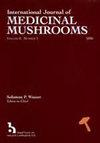Taxonomic Identification and Nutritional Profiling of Wild Isolates of the Pink Oyster Mushroom Pleurotus djamor (Agaricomycetes) from Northwestern Himalayas (India)
IF 1.4
4区 生物学
Q4 MYCOLOGY
International journal of medicinal mushrooms
Pub Date : 2024-01-01
DOI:10.1615/intjmedmushrooms.2024053282
引用次数: 0
Abstract
For generations, individuals have been incorporating wild edible fungi into their diets. Precisely identifying mushrooms is essential for harnessing their potential benefits for human use. Specifically, the taxonomical identification of Pleurotus species is known for its complexity. In modern times, it is always necessary to use molecular analysis as a valuable approach for gaining a deeper understanding of the systematics and the delineation of species. Thus, this study confirmed the identity of two wild isolates of Pleurotus djamor (pink oyster mushroom) using the internal transcribed spacer sequences. The amplicons underwent sequencing, and the resulting data was assembled and analyzed. The nucleotide sequences of the two wild isolates blasted against sequences from GenBank database revealed that two wild isolates matched 96.80 and 95.27% P. djamor with accession number KF280324.1 and KT273366.1. Commercially cultivated species took less time for spawn run (17.75 days), primordial initiation (22.25 days) and recoded highest biological efficiency (73.92%) among wild isolates. Nutritional analysis revealed that wild isolates showcase an abundance of nutrients, surpassing commercially cultivated species in terms of moisture, protein, and crude fiber content. This distinctive nutritional profile positions wild isolates as an exceptional superfood, fostering overall health enhancement.喜马拉雅山西北部(印度)粉红杏鲍菇(姬松茸)野生分离菌的分类鉴定和营养分析
世世代代,人们都将野生食用菌纳入自己的饮食中。要利用蘑菇对人类的潜在益处,准确识别蘑菇至关重要。具体来说,褶菇物种的分类鉴定以其复杂性而闻名。在现代,使用分子分析作为深入了解系统学和物种划分的一种有价值的方法总是很有必要的。因此,本研究利用内部转录间隔序列确认了 Pleurotus djamor(粉红杏鲍菇)的两个野生分离物的身份。对扩增子进行了测序,并对所得数据进行了汇总和分析。将两个野生分离物的核苷酸序列与 GenBank 数据库中的序列进行比对,发现两个野生分离物与 P. djamor 的吻合率分别为 96.80% 和 95.27%,登录号分别为 KF280324.1 和 KT273366.1。在野生分离物中,商业栽培种的产卵时间(17.75 天)和初生时间(22.25 天)较短,生物效率最高(73.92%)。营养分析表明,野生分离种富含营养物质,在水分、蛋白质和粗纤维含量方面超过了商业栽培种。这种独特的营养成分使野生分离物成为一种特殊的超级食品,可促进整体健康。
本文章由计算机程序翻译,如有差异,请以英文原文为准。
求助全文
约1分钟内获得全文
求助全文
来源期刊
CiteScore
2.60
自引率
16.70%
发文量
91
审稿时长
6-12 weeks
期刊介绍:
The rapid growth of interest in medicinal mushrooms research is matched by the large number of disparate groups that currently publish in a wide range of publications. The International Journal of Medicinal Mushrooms is the one source of information that will draw together all aspects of this exciting and expanding field - a source that will keep you up to date with the latest issues and practice. The International Journal of Medicinal Mushrooms published original research articles and critical reviews on a broad range of subjects pertaining to medicinal mushrooms, including systematics, nomenclature, taxonomy, morphology, medicinal value, biotechnology, and much more.

 求助内容:
求助内容: 应助结果提醒方式:
应助结果提醒方式:


